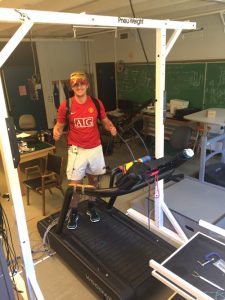Project title: Efficacy of Novel Movement Treatment Regimes in Decreasing Spasticity
Supervisor: Dr. Paul Zehr

Can you describe your project?
After stroke there are changes in arm and leg coordination as well as increased muscle activity and spasticity in some muscles, which cause problems during walking. Because of this, many stroke survivors have flexed postures of one arm and one leg that often scuffs the floor when walking. Drugs can be taken to reduce too much muscle activation, but these same drugs also make people very tired and weak. Interventions that can reduce excessive muscle activity in overactive muscles and increase muscle activity in underactive muscles include rhythmic arm and leg training such as on an exercise machine.
Unfortunately, sometimes the spasticity makes it impossible to have enough movement to actually train on any exercise equipment. Combined Botox© (a chemical that temporarily weakens over-active muscles) and ankle and elbow movement training (on a single limb rhythmic activation device) can help train stroke participants to a level that allows them to begin use of full exercise devices in a rehabilitation program. This approach could work well to bridge these severely affected patients into current research protocols such as strength training and arm and leg cycling. This project is a mechanistic assessment of the concept that single limb oscillation training combined with botulinum toxin therapy can improve patient range of motion sufficient to progress to whole body arm and leg cycling locomotor interventions
Why were you interested in working on this project?
I was interested in working on this project because I have always been fascinated by neuroscience and rehabilitation. This project was a great way to learn more about the basic science involved in rehabilitation while gaining some much needed research experience.
What’s one thing that surprised you about the research?
I was most surprised that I would actually enjoy research. I had always looked at research as a tedious process that can be overwhelming at times. My experience in the lab this summer, and specifically being involved in the scientific process, made me realize how valuable research is to my learning. Asking and answering research questions through raw data collection and analysis showed me how research can really consolidate my knowledge in a field of interest.
How will this research experience help you in your future medical studies?
This research experience has opened up a new area of learning for me. It also helped me realize how interesting research can be when you are passionate about what you study. I plan to further my research experience in the future regarding physical rehabilitation, either in my career or my residency, as this opportunity has reinforced my passion in this field of study.
What’s the most important thing you’ve learned from your project? How has it influenced your perspective on medicine and patient care?
The most important thing I learned from this project is that I am capable of doing research on my own. I realized how much teamwork is involved in the lab and in the scientific community as a whole. You truly are never on your own when conducting research.
This experience has influenced my perspective on medicine and patient care by showing me how much work goes into evidence-based treatment. It is simple to follow evidence-based guidelines without thinking how much work has gone into the development of those guidelines. I’ve also learned that, in research, almost nothing is 100% black and white. This is important to understand when considering patient variability while following evidence-based guidelines in medicine.
Is there anything else you’d like to share?
The SSRP was a great chance for me to become fully immersed in research. I really enjoyed working in the Neuroscience Rehabilitation Lab at UVic this summer. My colleagues and my supervisor, Dr. Zehr, made this experience even more enjoyable. I would strongly recommend this program to any students looking to gain research experience during the short summer period.
________________________________________
Originally posted by Rhys Mahannah, Admissions and Communications Coordinator, Island Medical Program at The University of Victoria